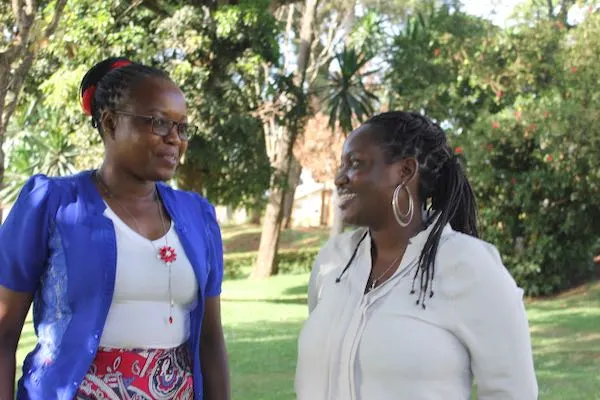By Patty Huston-Holm
At 9 a.m. Monday, April 4, 2022, an email from Lilian Lyavaala popped up. It read: “I am glad to inform you that we now have office space for the Writing Center.”
I smiled as I suspect Lilian did. This was one more step in establishing a specific Uganda Christian University (UCU) space with a specific purpose – quality writing. The center’s designated area is up the first flight of steps of the Hamu Mukasa Library on the main campus in Mukono.
Just one week prior, March 28, while sitting in plastic chairs under a tree near the Foundation Studies building, Lilian and I mildly celebrated her appointment as the center’s first “acting” coordinator as we joked that we couldn’t even find someone who had a key to unlock the designated space for the center and if we could, there wouldn’t be furniture to sit upon there.
The UCU journey to better writing is decades long. Like most universities, writing at UCU has been taught in foundation (general education) courses and seminars and strongly emphasized in research and lectures about avoiding plagiarism.
But a center?
That trek was accelerated with the late summer 2021 arrival of Prof. Tom Deans, American Fulbright Scholar in Uganda and Director of the University of Connecticut (USA) writing center. In collaboration with UCU academic staff, he drafted a plan. The five-page plan talks about a “hub” where students and staff can get peer coaching. While reinforcing the value of all types of writing for various purposes, Deans commented in a November 2021 article that “students won’t grow as researchers unless they are writing papers that involve sustained research.”

With cautious excitement, Deans and Lilian talked about the center, which would be the first for any university in Uganda, while being interviewed in a late February podcast through the UCU School of Journalism, Media and Communication. In that interview, they described centers as “welcoming places to meet students wherever they are” and writing as the “core of human learning.”
Now, it was early April. Things appeared to be moving. A UGX 26 million ($7,500) budget for computers, tables and chairs was approved, but money not allocated. That budget did not include funding to pay the center’s coordinator and tutors. In mid-April, a $10,000 donation, contingent on a matching $10,000 from UCU, and from the Muriel Lile Trust of Fenton, Michigan, USA, through the Uganda Partners NGO appeared to seal the deal. On April 25, a letter from David Mugawe, Deputy Vice Chancellor, Finance and Administration, confirmed the UCU $10,000 match. The writing center, under the UCU School of Education, has a $20,000 budget for 2022-2023.
Dr. James Busimba, head of UCU’s Department of Languages and Literature, which is the umbrella for the writing center, said that the door for writing tutor applications and student/faculty users of the tutors is open.
“The room is available,” Dr. Busimba said. “We are grateful that we have come this far and are hopeful.”
Lilian is likewise excited.
“There is a big gap in writing practices,” she says. “Students in secondary (high school) are only taught to pass their exams. The university should overhaul this mindset and strike a balance. It’s important to transform minds to let students know how they can and should use writing in all careers.”
Once the UCU center is fully operational as defined by Deans as “when the first student walks in,” there will be a coordinator and tutors among the furnishings. The design calls for a coordinator to work 15 hours a week. The interim coordinator is Lyavaala, a UCU lecturer since 2010. During the most-recent semester, she was teaching to students of Law, School of Medicine, IT, Computer Science and Civil Engineering.
“I begin my classes by telling my students why writing is important,” she says. “Then, I take them through the whole writing process. Writing is not spontaneous, but gradual. One has to think of what one wants to write, gather information, draft it, making the necessary changes and then coming up with the final draft, while focusing on the audience. At this stage, the students also get opportunity to unlearn what they learned wrong.”
Across the different faculties and schools Lilian Lyavaala teaches or has taught, she finds the best writers from all, but especially students studying law, medicine and engineering. Their classes are fascinating to teach, since most of them are self-motivated.
“They seem to understand that they need to write lab reports and document findings and that scientists need to be able to present findings that everyone can understand,” she said.
For Lilian, reading and writing were her passions since childhood. Her parents said she was spelling out words at an early age. She would sit for hours, listening to her grandmother tell stories. In primary, teachers had her lead reading classes. Her love of language helped her attain her master’s degree in Literature in 2018 at UCU, where she also had earlier attained her bachelor’s degree in English Language and Literature.
“You don’t have to be as passionate about writing as I am to be a good writer,” Lilian says. She echoed what Deans asserted during his time on campus in that the tutors don’t necessarily have to be perfect writers but “capable and care about writing.”
“Everybody can write,” she said. “It’s time we stopped saying otherwise.”


